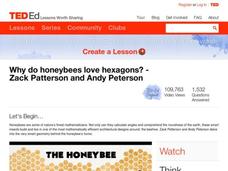Visual Learning Systems
Life Cycles: Life Cycle of Flowering Plants
Upon viewing the Life Cycles video series, students will be able to do the following: Understand that living things go through changes in the course of their lives referred to as a life cycle. State that most living things follow a...
Visual Learning Systems
Life Cycles: Amphibian Life Cycles
Upon viewing the Life Cycles video series, students will be able to do the following: Understand that living things go through changes in the course of their lives referred to as a life cycle. State that most living things follow a...
Visual Learning Systems
Life Cycles: Video Assessment
Upon viewing the Life Cycles video series, students will be able to do the following: Understand that living things go through changes in the course of their lives referred to as a life cycle. State that most living things follow a...
Visual Learning Systems
Life Cycles: Life Cycles of Mammals
Upon viewing the Life Cycles video series, students will be able to do the following: Understand that living things go through changes in the course of their lives referred to as a life cycle. State that most living things follow a...
Visual Learning Systems
Life Cycles: Summing Up
Upon viewing the Life Cycles video series, students will be able to do the following: Understand that living things go through changes in the course of their lives referred to as a life cycle. State that most living things follow a...
Visual Learning Systems
Life Cycles: Introduction
Upon viewing the Life Cycles video series, students will be able to do the following: Understand that living things go through changes in the course of their lives referred to as a life cycle. State that most living things follow a...
Visual Learning Systems
Life Cycles: What Is a Life Cycle?
Upon viewing the Life Cycles video series, students will be able to do the following: Understand that living things go through changes in the course of their lives referred to as a life cycle. State that most living things follow a...
Visual Learning Systems
Animal Life Cycles
In this video, we explore the fascinating process of metamorphosis in insects and other animals. From the eggs hatching into larva, to the development of pupa and the emergence of adults, we learn about the distinct stages of...
Natural History Museum
How to grow a wildflower pot for pollinators | Natural History Museum
You don't need a lot of room to give your neighbourhood butterflies and bees a boost. Growing native wildflowers in a container is an easy way to give your outside space a burst of colour while supporting important pollinating insects....
SciShow
Squid Proteins, but Make Them Fashion
Humans often take inspiration from nature when coming up with inventions, and this includes breakthroughs in fabric design that help to forward the fabulous and functional world of fashion.
SciShow
9 Weird Ways Animals Communicate
We all know ducks quack, dogs bark, and birds chirp, but that barely scratches the surface of all the amazing ways animals have devised to talk to each other!
Mazz Media
Life Cycle
This live-action video program is about the term life cycle. The program is designed to reinforce and support a student's comprehension and retention of the term life cycle through use of video footage, photographs, diagrams and...
Mazz Media
Invertebrate
This live-action video program is about the word invertebrate. The program is designed to reinforce and support a student's comprehension and retention of the word invertebrate through use of video footage, photographs, diagrams and...
SciShow
8 Crafty Plants That Have Mastered Deceit
While plants don't really have the thumbs required for high-end cosplay, here are a few that have made a career of looking like something they're not. Chapters View all SOUTH AFRICAN RESTIAD 0:37 COMMON LUNGWORT 1:39 PEBBLE PLANTS 2:36...
Brave Wilderness
HANDS get DESTROYED by Fire Ants!
On this episode of Base Camp, Coyote, Mark and Mario take a look at the time Coyote’s hands got completely destroyed by Fire Ants!
Curated OER
Monarch Butterflies
Monarch butterflies are as fragile as they look and a small change of their environment could have a huge impact on their lives. Watch this video to learn about one instance where over 250 million monarch butterflies died.
Curated OER
Pollination, Plants and Insects
The pollination of milkweed involves a high risk for the bees and butterflies involved. Though the nectar is sweet and delicious, the pollen is very sticky. If a bee is not strong enough to pull the pollen free, he will be stuck and die....
TED-Ed
The Weird and Wonderful Metamorphosis of the Butterfly
How does a caterpillar become a butterfly? Watch a video that details the metamorphosis of a butterfly, and discover a world of insects that also undergo metamorphosis.
The Brain Scoop
Moths vs Butterflies
What's the difference between a chrysalis and a cocoon? A chrysalis comes from the butterfly's skin, while a cocoon comes from any nearby materials a moth uses. The Brain Scoop video explains the similarities and differences between...
The Brain Scoop
Insect Adventure, Part 2
Scholars look forward to using the pooter, otherwise known as an aspirator, to collect insects. The video demonstrates how to collect bugs in mesh nets, canvas nets, and in pooters to better study them. The second installment of a...
Curated OER
Giant Centipede
Want to get up close and personal with a giant centipede? Watch this video and you will! Learn about the giant centipede's daily living habits in this National Geographic video clip.
TED-Ed
Why Do Honeybees Love Hexagons?
Float like a butterfly, think like a bee! Build a huge hive, hexagonally! Find out the reason that hexagons are the most efficient storage shape for the honeybees' honeycombs. This neat little video would be a sweet addition to your life...










